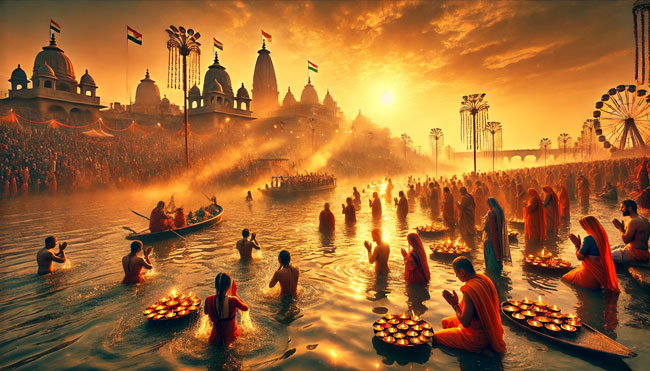 The Kumbh Mela is a grand celebration of India’s eternal traditions and religious faiths. Held every 12 years at Prayagraj, Haridwar, Ujjain, and Nashik, the event symbolizes spiritual purity and devotion. Among these, taking a holy dip at the Sangam in Prayagraj holds special significance.
The Kumbh Mela is a grand celebration of India’s eternal traditions and religious faiths. Held every 12 years at Prayagraj, Haridwar, Ujjain, and Nashik, the event symbolizes spiritual purity and devotion. Among these, taking a holy dip at the Sangam in Prayagraj holds special significance.
The Importance of Sangam
The word “Sangam” means the confluence of three rivers. In Prayagraj, the sacred rivers Ganga, Yamuna, and the mythical Saraswati meet. It is believed that bathing in these holy waters cleanses one’s sins and paves the way for liberation (moksha).
The Mythological Story
The origins of the Kumbh Mela are deeply rooted in the story of the Samudra Manthan (churning of the ocean). During this event, when the gods (Devas) and demons (Asuras) churned the ocean to obtain the nectar of immortality (Amrit), a few drops of nectar fell on four locations—Haridwar, Prayagraj, Ujjain, and Nashik. These spots became sacred, leading to the tradition of the Kumbh Mela.
As per the legend, Garuda, the divine bird, carried the pot of nectar to protect it from demons. While flying, a few drops of nectar spilled at these four places, making them spiritually significant.
Spiritual Benefits of Sangam Bath
- Purification of Sins: It is believed that a dip in the Sangam purges all sins and impurities.
- Spiritual Cleansing: The holy bath cleanses the soul and brings inner peace.
- Path to Liberation: Bathing at Sangam during the Kumbh is said to lead one toward salvation (moksha).
- Scientific Perspective: The minerals and natural herbs present in the waters of Ganga and Yamuna also provide health benefits.
Rituals and Beliefs
Along with bathing, devotees engage in prayers, meditation, donations, and listening to sacred stories during the Kumbh Mela. Saints and seers deliver special sermons, adding to the spiritual ambiance.
Modern Significance of Sangam
Even today, millions of devotees gather at the Kumbh Mela to take a holy dip at the Sangam, reflecting their deep faith in India’s cultural and spiritual heritage.
Conclusion
The Sangam bath is the soul of the Kumbh Mela. It not only holds immense religious and spiritual significance but also represents the unity and purity of Indian traditions. Rooted in ancient myths and spiritual beliefs, the act of bathing at the Sangam inspires individuals toward inner peace, spiritual enlightenment, and the ultimate goal of liberation.




